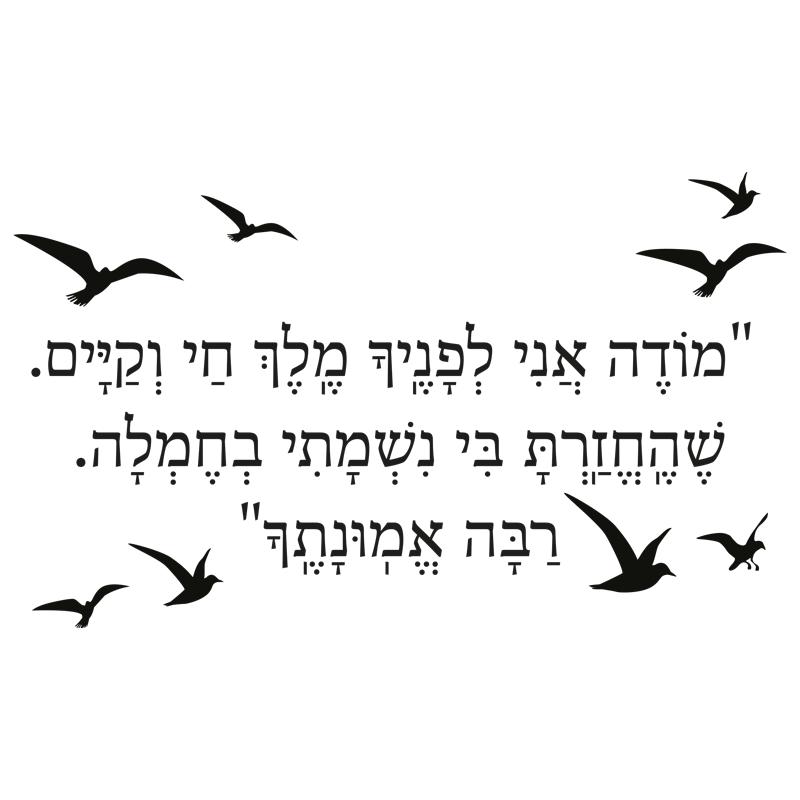BS”D
Suka 33 a-b.
Shvat 23, 5782. January 25, 2022
1- We continued to discuss the . יש דחוי אצל מצוות או לא topic…
We discussed the three stages of דיחוי:
1- Prior to the time of the מצווה.
2- After the start of the מצווה period.
3- The ‘gray area’.

In our case – in regards to a lulav with הדסים which are פסול and then became ‘Kosher’.
Before Sukkos. That is not considered דיחוי.
After sundown on Sukkos. That is definitely considered דיחוי, since Yom Tov has begun.

Before Yom Tov, but after it is bound:
If binding a Lulav is obligatory, then the מצווה has begun even before Yom Tov.
2- We continued to discuss the example mentioned last week concerning an Israeli who is in חוץ לארץ, if he keeps one or two days Yom Tov. Ditto for an American visiting Israel. The controversy within Chabad as what to do. One or two days? Was there a change in the Rebbe’s opinion?
We spoke about the ‘final’ version of the Alter Rebbe Shulchan Aruch, 1, 8.
8 The time of midnight is always [calculated] in the same manner in summer and winter— twelve hours after noon. This is the actual midpoint of the night, and a time of Divine favor above, at all times and in all places. Although the length of the days and the nights varies according to the climates [i.e., the various latitudes] and the longitudinal distances between one country and another, that does not change the above. This resembles the times for reciting Shema and Shemoneh Esreh and the times at which the Shabbos or the festivals commence, which are also [calculated] for each country according to the times of its own day and night.
(For the time of “עֵת רָצוֹן” above, and the יִחוּדִים עֶלְיוֹנִים effected by the recitation of Shema and Shemoneh Esreh, and the sanctity of Shabbos and the festivals — all transcend the limits of space and time, though they radiate “downward” into the physical realms to each and every place at the time appropriate for it. This also explains why a sublime holiness pervades in the Diaspora on the second day of a festival; hence inhabitants of Eretz Yisrael who are temporarily in the Diaspora are obliged to observe the holiness of that day, even though they intend to return [to Eretz Yisrael].68 This will be explained in the laws pertaining to the festivals.69)
חוּזְמַן חֲצוֹת לַיְלָה פז הוּא שָׁוֶה בַּקַּיִץ וּבַחֹרֶף,66 לְעוֹלָם שְׁתֵּים עֶשְׂרֵה שָׁעוֹת אַחַר חֲצִי הַיּוֹם, שֶׁהוּא אֶמְצַע הַלַּיְלָה מַמָּשׁ, וְהִיא “עֵת רָצוֹן” לְמַעְלָה,פח בְּכָל זְמַן וּבְכָל מָקוֹם.
וְאַף שֶׁהַיָּמִים וְהַלֵּילוֹת מִשְׁתַּנִּים לְפִי הָאַקְלִימִים וְרִחוּק הַמְּדִינוֹת זוֹ מִזּוֹ מִמִּזְרָח לְמַעֲרָב – אֵין בְּכָךְ כְּלוּם.67 וּכְמוֹ זְמַן קְרִיאַת שְׁמַע וּתְפִלָּה וּזְמַן כְּנִיסַת שַׁבָּת פט וְיוֹם־טוֹב, שֶׁהוּא גַּם כֵּן בְּכָל מְדִינָה וּמְדִינָה לְפִי זְמַן הַיָּמִים וְהַלֵּילוֹת שֶׁלָּהּ. (כִּי “עֵת רָצוֹן” שֶׁלְּמַעְלָה, וְיִחוּדִים עֶלְיוֹנִים שֶׁבִּקְרִיאַת שְׁמַע וּתְפִלָּה, וּקְדֻשַּׁת שַׁבָּת וְיוֹם־טוֹב – הוּא לְמַעְלָה מִגֶּדֶר הַמָּקוֹם וְהַזְּמַן, רַק שֶׁמֵּאִיר לְמַטָּה לְכָל מָקוֹם וּמָקוֹם בִּזְמַנּוֹ הָרָאוּי לוֹ. וְזֶהוּ גַּם כֵּן הַטַּעַם שֶׁשּׁוֹרָה קְדֻשָּׁה עֶלְיוֹנָה בְּחוּץ לָאָרֶץ בְּיוֹם־טוֹב שֵׁנִי שֶׁל גָּלֻיּוֹת. וְלָכֵן גַּם בְּנֵי אֶרֶץ יִשְׂרָאֵל הַבָּאִים לְחוּץ לָאָרֶץ חַיָּבִים בִּקְדֻשַּׁת הַיּוֹם אַף שֶׁדַּעְתָּם לַחֲזֹר,68 כְּמוֹ שֶׁנִּתְבָּאֵר בְּהִלְכוֹת יוֹם־טוֹב).צ, 69
We read the text of the above that is the basis of the various opinions.
Next week bl”n, we will discuss the fascinating פרשת דרכים on this topic.

3- As the Gemara mentioned a few times, there is a dispute if the binding of the Lulav is a must. Rebi Yehuda says it’s a חיוב, whereas the חכמים say it is not. Nevertheless, even the חכמים agree that at the very least it is a מצווה of – נוי מצווה. זֶה אֵלִי וְאַנְוֵהוּ
Binding a Lulav makes it presentable so it’s not just a bunch of items held by the holder’s hand.
4- We discussed if a woman [or a goy] can bind the Lulav. In general, the rule is that only people obligated to perform a particular מצוה can create the מצוה. Such as תפילין.

We discussed if a woman can perform a Bris. See here. YD 264, 1.

In regards to Lulav, a woman is not obligated to Bentch on it, so perhaps she can bind it, since, as above, there is no חיוב to bind it! On the other hand, there is a Mitzvah to bind. See here. OC 649, 1. And MA 8.
5- Today’s Chitas was about the laws of שומרים and שואל.
We concluded with the words of the Rebbe said by the Bar Mitzvah of Reb Shmuel Heber in 1942. He was a sweet Chosid that lived in S Louis.

To listen to some snippets of his חזנות see here.
A נשמה is ‘loaned’ to every person for the duration of one’s life. When he returns it, as with every return of a loaned item, it needs to be returned in good condition.
The laws of a שואל, a borrower, are more stringent than that of a renter or of a שומר. Both, whether a שומר or שואל, are obviously required to return the item to its owner. However, a שואל’s responsibility is a ‘general and no fault liability’. If it was stolen or lost, or even if an אונס happened, he is obligated to pay for the lost object he borrowed.
So all excuses one may have for not returning his נשמה in good condition, will not be accepted.

So what does one do, asked the Rebbe?
There is an exception to this general liability, answered the Rebbe. As the תורה writes : בעליו עמו לא ישלם. Mishnah, Bava Metzia, 94a
מתני׳ השואל את הפרה ושאל בעליה עמה או שכר בעליה עמה שאל הבעלים או שכרן ואחר כך שאל את הפרה ומתה פטור שנאמר (שמות כב, יד) אם בעליו עמו לא ישלם
If the owner/lender is present at the time of the borrowing and is ‘borrowed with the object’ then there is no liability from the borrower. [There are various reasons given for this interesting Halachah – see discussion here].
So if one wants to insure that his נשמה, when it is returned to its ‘owner’, does not incur any ‘payment for damages’ ח”ו, then the owner must be there at the time of the borrowing. And that is the מודה אני that one says every morning.

When borrowing our נשמה every morning, prior to anything else, we must borrow the ‘owner’ with it. By doing that we are absolved from any damages that the נשמה may encounter during the day.
This is what the Rebbe told Reb Shmuel at his Bar Mitzvah. See here. רשימות קל. Also ויצא תשמ״ח.